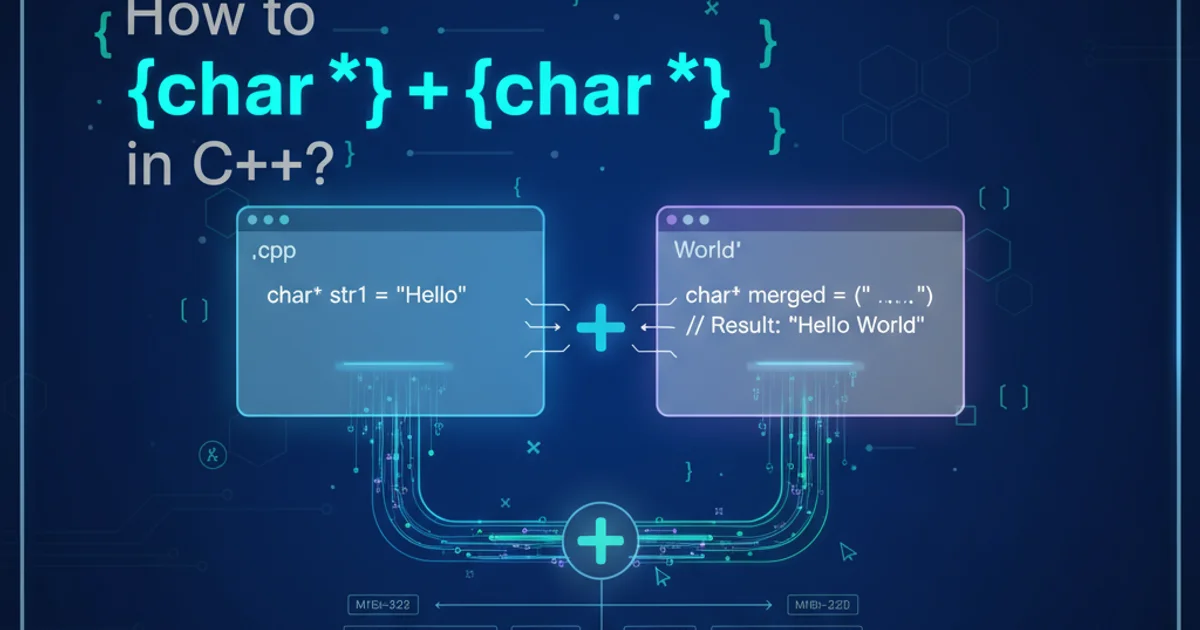Using string.pop_back() and string.back()
Categories:
Mastering C++ String Manipulation: pop_back() and back()

Explore the utility of std::string::pop_back() and std::string::back() for efficient character manipulation in C++11 and beyond.
In C++, the std::string class provides a rich set of functionalities for manipulating sequences of characters. Among these, pop_back() and back() are two powerful member functions introduced in C++11 that offer convenient ways to interact with the last character of a string. This article delves into their usage, behavior, and common pitfalls, helping you write more efficient and readable C++ code.
Understanding std::string::back()
The std::string::back() member function provides direct access to the last character of a string. It returns a reference to the last character, allowing you to read or modify it. This function is particularly useful when you need to inspect or change the trailing character without needing to know the string's length or perform index calculations.
Key Characteristics:
- Return Type:
char&(a reference to the last character). - Complexity: Constant time, O(1).
- Precondition: The string must not be empty. Calling
back()on an empty string results in undefined behavior.
#include <iostream>
#include <string>
int main() {
std::string s = "Hello World!";
// Access the last character
char lastChar = s.back();
std::cout << "Last character: " << lastChar << std::endl; // Output: !
// Modify the last character
s.back() = '?';
std::cout << "Modified string: " << s << std::endl; // Output: Hello World?
// Undefined behavior if called on an empty string (don't do this!)
// std::string empty_s;
// empty_s.back();
return 0;
}
Example demonstrating the usage of std::string::back().
std::string::back(). You can check this using s.empty() or s.length() > 0 to prevent undefined behavior.Understanding std::string::pop_back()
The std::string::pop_back() member function removes the last character from the string. It effectively shortens the string by one character. This is a convenient and efficient way to trim characters from the end of a string, often used in parsing or data cleaning operations.
Key Characteristics:
- Return Type:
void(it modifies the string in place). - Complexity: Amortized constant time, O(1). While individual calls might sometimes trigger reallocations, the average cost over many operations is constant.
- Precondition: The string must not be empty. Calling
pop_back()on an empty string results in undefined behavior.
#include <iostream>
#include <string>
int main() {
std::string s = "ExampleString";
std::cout << "Original string: " << s << std::endl; // Output: ExampleString
s.pop_back(); // Removes 'g'
std::cout << "After pop_back(): " << s << std::endl; // Output: ExampleStrin
s.pop_back(); // Removes 'n'
std::cout << "After another pop_back(): " << s << std::endl; // Output: ExampleStri
// Undefined behavior if called on an empty string (don't do this!)
// std::string empty_s;
// empty_s.pop_back();
return 0;
}
Example demonstrating the usage of std::string::pop_back().
pop_back() or resize() for more control. For example, to remove all trailing whitespace, you might combine back() and pop_back().Combined Usage and Common Scenarios
Often, back() and pop_back() are used together to inspect and then remove the last character, or to conditionally remove characters based on their value. This pattern is common in tasks like removing trailing delimiters, processing stack-like data in a string, or cleaning up input.
The following diagram illustrates a typical workflow involving both functions.
flowchart TD
A[Start]
B{Is String Empty?}
C[Access Last Character (back())]
D{Condition Met?}
E[Remove Last Character (pop_back())]
F[Process Character]
G[End]
A --> B
B -- Yes --> G
B -- No --> C
C --> D
D -- Yes --> E
E --> F
F --> B
D -- No --> GWorkflow for conditionally processing and removing the last character of a string.
#include <iostream>
#include <string>
int main() {
std::string data = "value1,value2,value3,";
std::cout << "Original: " << data << std::endl;
// Remove trailing comma if present
if (!data.empty() && data.back() == ',') {
data.pop_back();
}
std::cout << "After removing trailing comma: " << data << std::endl; // Output: value1,value2,value3
std::string path = "/usr/local/bin/";
std::cout << "Original path: " << path << std::endl;
// Ensure path does not end with a slash
while (!path.empty() && path.back() == '/') {
path.pop_back();
}
std::cout << "Normalized path: " << path << std::endl; // Output: /usr/local/bin
return 0;
}
Combined usage of back() and pop_back() for string cleaning.
pop_back() and back() are valuable additions to the std::string interface, offering concise and efficient ways to manipulate the end of a string. By understanding their preconditions and behavior, you can leverage them to write cleaner and more performant C++ code for various string processing tasks.